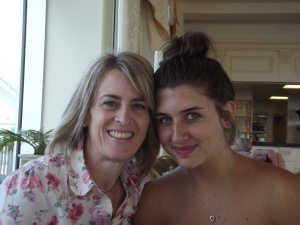Someone… and you know who you are! – someone mentioned ‘gormless’. It’s such a great word, it so perfectly captures in sound what it means! No wonder Mervyn Peake used it in his ‘Gormenghast Trilogy’ – Gormenghast Castle belonged to the Earl of Groan, and the books are full of wonderful and extraordinary names. However, I’m drifting away from ‘gormless’; it’s tempting to wonder whether there is also ‘gorm’, and ‘gormful’, and maybe even ‘gormish’ and ‘gormly’?
I wrote a post some time ago, not just about ‘gorm’ but also ‘reck’ – as in reckless. and ‘ruth’, as in ruthless:
Other people have blogged about this with much more authority than I can, but I just did want to mention these funny English words which have a suffix or prefix as if they had a noun which could stand alone.
In my novel ‘Night Vision’, Beulah and her husband are talking about his brother who he describes as ‘gormless’. Neil hates and loathes his brother, and Beulah tries to diffuse his annoyance by making a play on the word ‘gormless’
“Was there something wrong with him?” Beulah couldn’t help but ask. “What did he look like?” she persisted even though Neil was becoming annoyed.
“Gormless,” Neil’s voice was like ice.
“I wonder what gormful means?” Beulah asked shutting the books firmly. “I wonder if it’s gormful or gormeous.”
“Or whether some people have gormness thrust upon them,” Neil seemed as anxious to forget it as she.
“Or gormship.”
“Or gormworthy.”
“How about ungorm?”
‘Gorm’ is a Scandinavian word and no doubt arrived in England as ‘gaum’ with the Vikings or other Scandi’s who settled here. Gaum meant sense, or having sense and gaumless meant the opposite, a bit like wit and witless. Gormless lingered on in Yorkshire and the north-east before spreading to the rest of the country. Emily Brontë is credited with sending it south in her novel ‘Wuthering Heights’ when the old servant Joseph uses it!
Reckless is another similar word – can you have reckful or unreck? Reck meant care… obviously! And then there is feckless… nothing to do with the Irish ‘feck’ which obviously is very different! Feckless comes from ‘effect’ which was changed by the Scots.
Ruth is a lovely name, I have a beautiful cousin – she is on holiday at the moment so I guess the family are Ruthless.. however the adjective comes from ‘rue’ – as in ‘rue the day’ meaning to regret, so we have ‘rueful’ but not ruthful’.
My cousin Ruth
I’m fascinated by words and if you are too, have a look at these links:
http://www.rinkworks.com/words/negatives.shtml
… and for more about Mervyn Peake:
http://www.mervynpeake.org/gormenghast/
…and if you haven’t read my novel ‘Night Vision’, here is a link:
https://www.amazon.co.uk/s/ref=nb_sb_noss_1?url=search-alias%3Daps&field-keywords=lois+elsden
By the way the castle in my featured image isn’t Gormenghast, it’s Dunluce in County Antrim in Northern Ireland



When I was young I delivered newspapers to an old Croation man and he always called me a marli magarats. I didn’t find out til recently that it meant little donkey in Croation. I would have thrown his paper in a mud puddle if I had known. I guess it was gormless in his lingo?
LikeLiked by 1 person
Aww, he might have meant it in a nice way… aren’t donkeys kind of cute?
LikeLike
Cute yes, smart no! Isn’t there a saying about being cute, dumb and happy? Or was that fat dumb and happy?
LikeLiked by 1 person
Weren’t they some of the seven dwarves?
LikeLike
Now I’m a cute dwarf donkey. Where is this going?
LikeLiked by 1 person
Maybe petite instead of dwarf?
LikeLike
Gotta go to the gym and release some frustration. Catcha later Lois.
LikeLiked by 1 person
Off you go then… I’ll just stay watching the sun set over here!
LikeLike